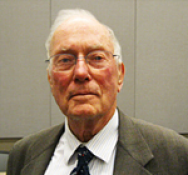Dr. Charles H. Townes, who received the Nobel Prize in 1964 for his role in the invention of the maser and the laser, is presently a Professor in the Graduate School at the University of California, Berkeley, and engaged in a research in astrophysics. He is known for a variety of researches involving the interaction of electromagnetic waves and matter, and also as teacher and government advisor.
Born July 28, 1915 in Greenville, South Carolina, Dr. Townes graduated with highest honors from Furman University in 1935, earning a bachelor of science degree in physics and a bachelor of arts degree in modern languages. He completed a master's degree at Duke University and in 1939 received the Ph.D. degree at the California Institute of Technology. He was a staff member of the Bell Telephone Laboratories 1939-1947, Associate Professor and Professor at Columbia University 1948-1961, Vice President and Director of Research at the Institute for Defense Analysis 1959-1961, Provost and Professor of Physics at the Massachusetts Institute of Technology 1961-1965, and became University Professor of Physics at the University of California, Berkeley in 1967.
Dr. Townes's principal scientific work is in microwave spectroscopy, nuclear and molecular structure, quantum electronics, radio astronomy, and infrared astronomy; he is presently most active in the latter two fields. He has the fundamental patent on masers, and with A.L.Schawlow, the basic patent on lasers. In addition to the Nobel Prize, he has received a number of awards and honors, including membership in the National Academy of Sciences and in the Royal Society of London, the National Academy of Sciences' Comstock Prize and the John J. Carty Medal, the Rumford Premium of the American Academy of Arts and Sciences, the Stuart Ballentine Medal of the Franklin Institute (twice), and the C.E.K. Mees Medal of the Optical Society of America, and the Medal of Honor of the Institute of Electrical and Electronics Engineers, the Plyler Prize of the American Physical Society, NASA's Distinguished Public Service Medal, the Thomas Young Medal and Prize of the Institute of Physics and the Physical Society (England), the Wilhelm Exner Award (Austria), the 1979 Niels Bohr International Gold Medal, membership in the National Inventors Hall of Fame, South Carolina Hall of Fame, Engineering and Science Hall of Fame, the National Medal of Science, as well as honorary degrees from twenty-five colleges and universities.
Dr. Charles H. Townes - 1999

Mendel Medal Presentation Program, January 23, 1999. Villanova University, Villanova, Pennsylvania.

